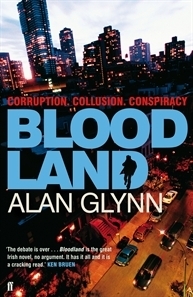Take a photo of a barcode or cover
My expectations were perhaps unreasonably high for this one, having loved Winterland so much.
The book was very good. Thematically, very similar to Winterland.
I felt like the book was trying to be a sprawling epic (three continents! presidential campaigns! shadowy multinational conglomerates!), but the somewhat straightforward plot just didn't match up with that goal.
Still, solid characters, lots of action, very entertaining. Sounds from the author notes like there will be another book in the series, and I'll preorder that one too.
The book was very good. Thematically, very similar to Winterland.
I felt like the book was trying to be a sprawling epic (three continents! presidential campaigns! shadowy multinational conglomerates!), but the somewhat straightforward plot just didn't match up with that goal.
Still, solid characters, lots of action, very entertaining. Sounds from the author notes like there will be another book in the series, and I'll preorder that one too.
Fast paced international thriller that I went through in 2 days. Not because it was short but rather because it was amazing and I had to race to the end.
Once I got the characters fully pinned-down in my head, it read pretty well and quickly. A very consumable whodunit sort of corporatocracy conspiracy/coverup/profiteering at all costs kind of story. I give it 3.5 stars, because while I read it quickly and wanted to keep coming back to it, there were too many points where I had to force myself to suspend disbelief. Jimmy Gilroy being the luckiest bastard on earth, with too many twists and turns landing in his lap, with too many hands-on CEOs, with too much incompetence. Silly to get that critical of a book of this sort, so I'd recommend reading it, with a chaser of "Confessions of an Economic Hitman."
A semi-sequel to WINTERLAND but much more engaging than the first book.
I had not yet read any of the author's previous work so was excited to see if I now had a "new" author to follow. I've read numerous "thriller" novels, no matter how you define that term, and have long been wary of trying new authors because there just seems to be so many that write by some perceived formula for "success". That's not always bad as I do like a good adrenaline rush as much as the next guy, as long as there are the other aspects of a good novel (like well written characterization, proper plotting, setting, etc.)
I am pleased to report that this novel is, indeed, very well written and offers taught plotting and excellent characterization. As others have mentioned, the first part of the book requires paying close attention to make sure you understand the many different characters and what their roles/motivations might be. I won't rehash the plot here as that has been done well by other reviewers but suffice it to say it's a plot that is not only plausible in today's political world, but even likely. Some reviewers refer to a "stream of consciousness" approach to the story-telling but don't let that dissuade you. The author uses present tense throughout but, in my mind, that simply reinforces the here-and-now urgency of the plot and serves to suck you in to the story.
I would have awarded 5 stars except for a small feeling of dissatisfaction with the way certain plot elements were resolved. Chalk that up to my need to witness events instead of being told about plot climaxes that occur off-stage. Other than that, a most satisfying reading experience and, indeed, I do now have a "new" author to follow.
I am pleased to report that this novel is, indeed, very well written and offers taught plotting and excellent characterization. As others have mentioned, the first part of the book requires paying close attention to make sure you understand the many different characters and what their roles/motivations might be. I won't rehash the plot here as that has been done well by other reviewers but suffice it to say it's a plot that is not only plausible in today's political world, but even likely. Some reviewers refer to a "stream of consciousness" approach to the story-telling but don't let that dissuade you. The author uses present tense throughout but, in my mind, that simply reinforces the here-and-now urgency of the plot and serves to suck you in to the story.
I would have awarded 5 stars except for a small feeling of dissatisfaction with the way certain plot elements were resolved. Chalk that up to my need to witness events instead of being told about plot climaxes that occur off-stage. Other than that, a most satisfying reading experience and, indeed, I do now have a "new" author to follow.
If you’re a fan of ‘70’s-style paranoid thrillers like the Parallax View or The French Connection—average man caught up in forces greater in scope and influence than he can imagine; shadowy conspiracies with machinations at the intersection of business and government—then you will enjoy Alan Glynn’s Bloodland.
An effective, timely and fast-moving thriller, Bloodland entertainingly weaves together many of the greatest current social, economic and geopolitical factors—e.g., the Chinese Industrial Revolution, celebrity culture, the financial collapse, the symbiotic relationships between private equity, manufacturing and the levers of governance, etc. What the book lacks in unexpected twists and surprises it makes up for in a tight, believable plot (to borrow from Stephen Colbert, the power of Bloodland rests in its “truthiness”).
Glynn maintains terrific narrative pace and story momentum. Instead of shocks (!!!) and cliffhangers, the author kept me turning the pages with a fairly well-constructed story (I’ll explain my reservations further down) that evinced a dread-filled sense of inevitability. Though the final conflict was exactly as expected, I give Glynn credit for pulling it off with real tension and uncertainty. I genuinely didn’t know how it would be resolved. The two most likely outcomes would have produced very different takeaways. With now two days of reflection on the ending, I would have preferred the ending I *thought* Glynn was building to, as I think it would have been more rewarding (if admittedly, more downbeat) vis-à-vis the overall story.
This gets to the crux of my greatest issue with Bloodland: the characters. Without spoiling either the plot details or the ending, I’ll just say that offering characters that are fleshed out only to the point of what they do—little more than avatars for the concerns/institutions they represent—then resolving the conflict by simply removing these bad actors, left me a bit cold. I think Glynn’s conclusion ably and cleanly serves the plot but not the story.
Bloodland is smart but not clever, revealing but not surprising and predictable but rewarding—more PBS mystery than CBS thriller.
An effective, timely and fast-moving thriller, Bloodland entertainingly weaves together many of the greatest current social, economic and geopolitical factors—e.g., the Chinese Industrial Revolution, celebrity culture, the financial collapse, the symbiotic relationships between private equity, manufacturing and the levers of governance, etc. What the book lacks in unexpected twists and surprises it makes up for in a tight, believable plot (to borrow from Stephen Colbert, the power of Bloodland rests in its “truthiness”).
Glynn maintains terrific narrative pace and story momentum. Instead of shocks (!!!) and cliffhangers, the author kept me turning the pages with a fairly well-constructed story (I’ll explain my reservations further down) that evinced a dread-filled sense of inevitability. Though the final conflict was exactly as expected, I give Glynn credit for pulling it off with real tension and uncertainty. I genuinely didn’t know how it would be resolved. The two most likely outcomes would have produced very different takeaways. With now two days of reflection on the ending, I would have preferred the ending I *thought* Glynn was building to, as I think it would have been more rewarding (if admittedly, more downbeat) vis-à-vis the overall story.
This gets to the crux of my greatest issue with Bloodland: the characters. Without spoiling either the plot details or the ending, I’ll just say that offering characters that are fleshed out only to the point of what they do—little more than avatars for the concerns/institutions they represent—then resolving the conflict by simply removing these bad actors, left me a bit cold. I think Glynn’s conclusion ably and cleanly serves the plot but not the story.
Bloodland is smart but not clever, revealing but not surprising and predictable but rewarding—more PBS mystery than CBS thriller.
This is not a book I'd normally pick up to read, but really enjoyed it. It's an exciting plot, good characters...I couldn't read fast enough to see how it ended.
mysterious
medium-paced
Plot or Character Driven:
Character





